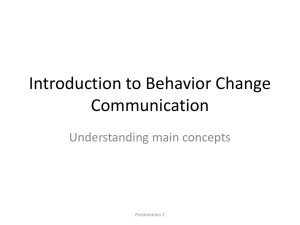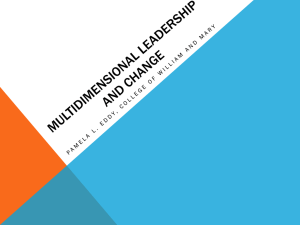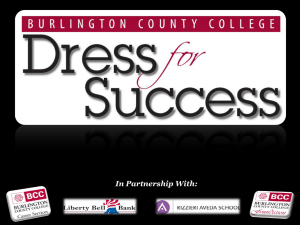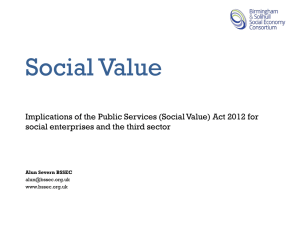BCC related theories: individual level
advertisement
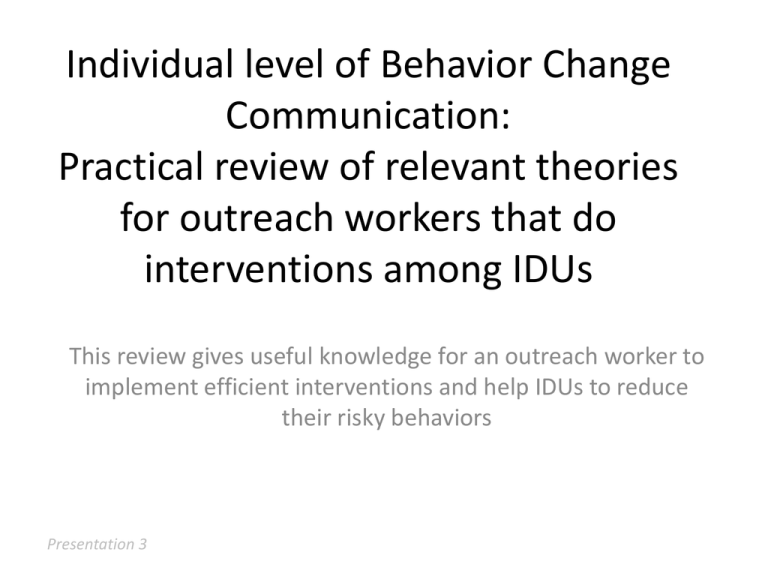
Individual level of Behavior Change Communication: Practical review of relevant theories for outreach workers that do interventions among IDUs This review gives useful knowledge for an outreach worker to implement efficient interventions and help IDUs to reduce their risky behaviors Presentation 3 Why it is important? • Provides understanding of process of behavior change • Gives knowledge of what to do and what not to do • Discovers reasons why people change behavior and why people may oppose changes • Explains some things that are usually hidden for observation but are important to take into account Main theories to be considered: Elaboration Likelihood Model (petty, Cacioppo) Social Learning Theory (Bandura) Protection Motivation Theory (Rogers, Lazarus, Leventhal, Boer, Seydel) Social Cognitive Theory (Miller, Dollard, Bandura, Walters) Social Support Theory (Barnes, Cassel, House, Berkman, Glanz) Transactional Model of Stress and Coping (Lazarus, Cohen, Antonovsky, Kats) Stages of Change Model Change (Prochaska, DiClemente) The Health Belief Model (Becker, Radius, Rosenstock) Theory of Planned Behavior/Reasoned actions (Ajzen, Fishbein) What is about? How does individual change his mind? (Elaboration Likelihood Model) What is role of other people in individual’s behavior change? (Social Learning Theory) How does individual typically act in case of perceiving certain behavior as risky and probably a one to change? (Protection Motivation Theory) What is role of individual’s environment in forming behavior and its change? (Social Cognitive Theory) What is social support and how it contributes to behavior change? (Social Support Theory) How people ordinary cope with stressful events? (Transactional Model of Stress and Coping) What stages does individual make in a process of changing behavior? (Stages of Change Model) How individual’s beliefs about risk, actions to be taken and about own capabilities affect behavior change? (Health Belief Model) What forms individual’s intention to undertake actions to avoid/reduce risk? (Theory of Planned Behavior/Reasoned Action) Theory: Elaboration Likelihood Model Key findings for Behavior Change Communication: • Attitudes are important – they guide decisions and other behaviors • Persuasion is a primary source to form an attitude • The key point is involvement (motivation and ability to think about the advocated position and arguments) • When people are motivated and able to think about the content of the message, elaboration (for changes, actions and etc.) is high BCC related theories: individual level Theory: Social Learning Theory Key findings for Behavior Change Communication: • People do change their behavior through learning from other people. It takes general stages: o Close contact – contact with people is basic condition o Imitation of superiors – a person needs a model of perfection to imitate o Understanding of concepts – a person needs to understand meanings behind imitated behavior or to find its own o Role model behavior: imitation + understanding of what is behind = role model behavior BCC related theories: individual level Theory: Social Learning Theory Key assumptions for outreach worker who work with IDUs: •It is important to be in a close trustful contact with client to talk about behavior change •Give a client right examples for imitation •Help a client to understand why the other person (example) does what he/she does and to find its own meaning to do similarly •Support a client in forming a convenient role behavior – explain a client what to do, show a client how to do it (give an example), help a client to find out why to do that BCC related theories: individual level Theory: Protection Motivation Theory Core Assumptions and Statements Recognizing health threat, people are expected to react it somehow. While reacting, a person demonstrates adaptive or maladaptive behavior. Adaptive or maladaptive coping with a health threat appears as a result of two appraisal processes: a process of threat appraisal and a process of coping appraisal. Adaptive behavior – intention to perform adaptive responses based on protection motivation. Maladaptive behavior – all those responses that place an individual at health risk, they include behaviors that lead to negative consequences and absence of behaviors, which eventually may lead to negative consequences. BCC related theories: individual level Theory: Protection Motivation Theory The theory proposes that the intention to protect oneself depends upon four factors: •The perceived severity of a health threat •The perceived probability of the occurrence or vulnerability of a person to the particular threat •The efficacy of the recommended preventive behavior •The perceived level of confidence in one’s ability to undertake the recommended preventive behavior BCC related theories: individual level Theory: Protection Motivation Theory Key assumptions for outreach worker who work with IDUs: •Give a client to understand thoroughly risks and danger of present state of things first (contribute to client’s threat appraisal) •Convince a client in personal vulnerability for the risks and help a client to understand why the particular health threat is very likely for him to happen •Explain clearly why the preventive measures you recommend are proven to be efficient to help a client to avoid the health threat •Discuss with a client whether the recommended preventive measures are easy for him to follow, consider obstacles and develop a personal guide on how to form a preventive skill or habit (remember social learning postulates: contact-example to follow-understanding of acquired behavior-encourage new role behavior) BCC related theories: individual level Theory: Social Cognitive Theory Core Assumptions and Statements Behavioral change depends on the factors: environment, people and behavior. These three factors are constantly influencing each other. There are social and physical environments. Social environment include family members, friends, colleagues and other relevant people. Physical environment: water, food, temperature, availability of drugs and etc. The environments provide models for behavior. BCC related theories: individual level Theory: Social Cognitive Theory Key findings for Behavior Change Communication: •To make people changed, it is important to understand their environments first •To make people changed, it is necessary to shift their environments or to change something in the environments (to remove some factors or to introduce new factors) •Behavioral capability – a person to perform behavior must know what the behavior is and have the skills to perform it BCC related theories: individual level Theory: Social Cognitive Theory Key assumptions for outreach worker who work with IDUs: •Assess your capabilities to change client’s environment and use it •Become a part of client’s environment •Let a client to understand a behavior change •Provide client with skills for behavior change BCC related theories: individual level Theory: Social Support Theory Core Assumptions and Statements Social support is associated with how networking helps people cope with stressful events. Social support through networking distinguishes between four types of support: Emotional support, Instrumental support, Informational support, Appraisal support. Emotional support is associated with empathy, love, trust and caring. Instrumental support involves the provision of tangible aid and services that directly assist a person in need. Informational support involves the provision of advice, suggestions and information that a person can use to address a problem. Appraisal support involves the provision of information that is useful for self-evaluation purposes: constructive feedback, affirmation and social comparison. BCC related theories: individual level Theory: Social Support Theory Key findings for Behavior Change Communication: •Networking helps people to cope with stressful events (like behavior change) •Behavior change goes better if a person receives enough empathy, love, trustful interpersonal contact and caring •It is important to provide a person with relevant instruments and services that will assist in a process of changes •It is very important to provide a person with necessary and useful information regarding behavior change and ensure that the information is understood •Constructive feedback, affirmations and social comparison are also very important on the way of behavior change BCC related theories: individual level Theory: Social Support Theory Key assumptions for outreach worker who work with IDUs: •Provide enough of clear information about threats and why to change something •Explain how to change, provide options and ready-to-use solutions •You may help people by gathering them together into self-support groups •Use supportive emotions for a person who is on stages of change •Provide feedback on a progress, and involve others to prove achievements BCC related theories: individual level Theory: Transactional Model of Stress and Coping Core Assumptions and Statements The transactional Model of Stress and Coping explains a process of how people cope with stressful events. Experience of coping with stress construes personal attitudes to various threats in further. Individual’s actions depend on how he/she appraise a threat, but also it depend on social and cultural factors. BCC related theories: individual level Theory: Transactional Model of Stress and Coping Simple scheme of the Model: (A THREAT APPEARS) •Is it really so significant for me? •Can I control it or cope with it easy and quickly? •What should I do to make the threat less important to me, to take control? •I undertake my efforts! •How can I see the threat differently and less significant? •I believe it is less serious for me now! I believe I can make it! •I feel better now! I’m proud for myself! •Next time I will do similarly because it seems working… •I neglect any further threat since I was successful to cope with the threats •Is it really so? It is really so! Is it really so? It is really so! Is it really so? … BCC related theories: individual level Theory: Transactional Model of Stress and Coping Key assumptions for outreach worker who work with IDUs: •Show a threat (risky behavior) and its significance for a particular person •Follow the process of how your client assess the situation by asking questions, listening and watching for signs of possible change •Make it possible to discuss options to undertake and help a client to choose a proper solution for further action •Support client in his actions •Make a client understand that a threat is still serious and it is important to be aware •Help a client to avoid a stereotype problem solving: different solutions for different problems •Encourage attention for threats (risks) and active search for proper ways of coping with them BCC related theories: individual level Theory: Stages of Change Model Core Assumptions and Statements The idea is that behavior change does not happen in one step. People tend to progress through different stages on their way to successful change. The model is related to the assumption that a decision to change (to move to the next stage of change) must come from inside of a person -- stable, long term change cannot be externally imposed. In each of the stages, a person has to do with a different set of issues and tasks that relate to changing behavior. Thus, for each for each stage of change, actions and tools are suggested. BCC related theories: individual level Theory: Stages of Change Model • Precontemplation (Not yet acknowledging that there is a problem behavior that needs to be changed) • Contemplation (Acknowledging that there is a problem but not yet ready or sure of wanting to make a change) • Preparation/Determination (Getting ready to change) • Action/Willpower (Changing behavior) • Maintenance (Maintaining the behavior change) • Relapse (Returning to older behaviors and abandoning the new changes) BCC related theories: individual level Presentation 3 Theory: Stages of Change Model Key assumptions for outreach worker who work with IDUs: •It is important to recognize risky behavior, to identify one to work with at once •Identify a stage of change for the particular risky behavior •There are suggested actions for a certain stage of stage – stick to them •Usually client doesn’t change a behavior immediately, it takes some time •Some behaviors take more time and attempts than others BCC related theories: individual level Theory: Health Belief Model Core Assumptions and Statements Health Belief Model is based on the understanding that a person will take a health-related action (e.g. use clean syringes or condoms), if that person: feels that a negative health condition can be avoided has a positive expectation that by taking a recommended action, he/she will avoid a negative health condition believes that he/she can successfully take a recommended health action BCC related theories: individual level Theory: Health Belief Model Key assumptions for outreach worker who work with IDUs: •Find out how a client assesses a risk, convince a client that the risk is more that real for him personally •Make a client understand that the risk is serious and will pose negative consequences •Provide how-to information, promote awareness, suggest options to avoid/reduce a risk •Help a client to realize and accept benefits of adopting of suggested behavior that reduces risk •Together with client consider and rearrange any serious barriers that may obscure or discourage adoption of promoted less risky behavior • BCC related theories: individual level Theory of Planned Behavior/Reasoned Action Core Assumptions and Statements Person’s behavior is determined by his/her intention to perform the behavior. Intention is the best predictor of probability of a behavior – representation of a person’s readiness to perform given behavior. Intention is determined by: • person’s attitude toward the specific behavior • person’s beliefs about how he/she will look like in other people’s view while practicing the specific behavior • person’s perception of own ability to perform given behavior BCC related theories: individual level Theory of Planned Behavior/Reasoned Action Key assumptions for outreach worker who work with IDUs: •Make sure that client’s attitudes toward the promoted behavior is positive •Let a client see that relevant others support him in adopting the promoted behavior •Improve client’s ability to manage and control the adopted behavior under various circumstances BCC related theories: individual level


